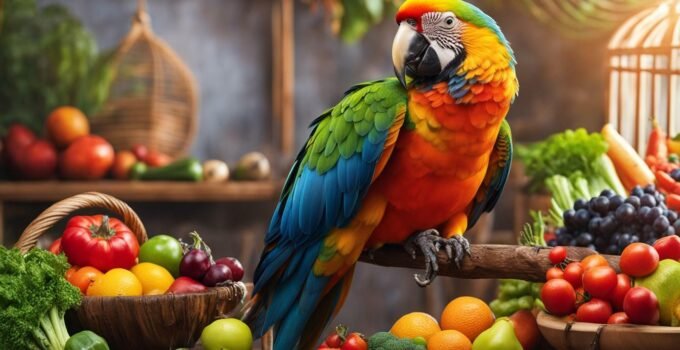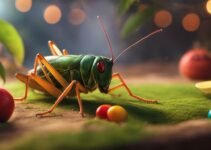Welcome to our essential guide on how to take care of a pet parrot. Owning a parrot is a unique and rewarding experience, but it also comes with a great deal of responsibility. Understanding the specific needs and providing proper care is crucial to ensure the well-being and happiness of your feathered friend.
Key Takeaways:
- Understanding the unique needs of pet parrots is essential for their care and well-being.
- Proper socialization, regular vet check-ups, and preventive care are crucial for maintaining a parrot’s health.
- A balanced diet that includes nutritious bird food and occasional treats is essential for a parrot’s overall well-being.
- Creating a safe and enriching habitat with suitable cages, perches, and toys provides mental and physical stimulation.
- Regular hygiene practices, grooming, and exercise are important for a happy and healthy pet parrot.
Understanding Parrot Species and Their Needs
When it comes to taking care of a pet parrot, it’s essential to understand the specific needs of different parrot species. Each species has its own unique characteristics and care requirements. By familiarizing yourself with these differences, you can provide the best possible care for your feathered friend.
Socialization is a crucial aspect of parrot care. Parrots are highly intelligent and social creatures that thrive on interaction and companionship. They need regular socialization with their human caregivers as well as other parrots to maintain their mental and emotional well-being. Providing opportunities for playtime and social interaction is vital for keeping your parrot happy and healthy.
It’s important to be aware of common parrot illnesses and their symptoms. Some species are more prone to specific health issues, such as respiratory infections or feather plucking. Regular vet check-ups are crucial to catch any potential health problems early on and to ensure your parrot receives appropriate medical care. By monitoring your parrot’s behavior, appetite, and physical condition, you can detect any signs of illness and seek veterinary assistance promptly.
Common Parrot Illnesses
| Illness | Symptoms | Treatment |
|---|---|---|
| Respiratory Infections | Coughing, sneezing, nasal discharge, labored breathing | Antibiotics prescribed by a veterinarian |
| Feather Plucking | Excessive feather chewing or pulling, bald patches | Identifying and addressing underlying causes, behavior modification techniques |
| Psittacosis (Parrot Fever) | Fever, lethargy, loss of appetite, respiratory symptoms | Antibiotics prescribed by a veterinarian |
| Avian Polyomavirus | Depression, weight loss, regurgitation, delayed crop emptying | Supportive care, vaccination, and antiviral treatments |
By understanding the specific needs of your parrot species and being proactive in their care, you can ensure a happy and healthy life for your feathered companion. Remember to provide plenty of socialization, monitor their health closely, and seek veterinary assistance when needed. Taking these steps will help you build a strong bond with your parrot and create a nurturing environment for their well-being.
Providing a Balanced Diet for Your Pet Parrot
One of the most important aspects of caring for a pet parrot is providing them with a balanced diet that meets their nutritional needs. A healthy diet plays a crucial role in their overall health and well-being. Here are some key considerations for providing a well-rounded diet for your feathered friend.
The Basics of Parrot Diet and Nutrition
A parrot’s diet should consist of a variety of fresh fruits, vegetables, seeds, and pellets. This ensures that they receive a wide range of nutrients essential for their optimal health. It’s important to offer a mix of different colored fruits and vegetables, as each color represents different vitamins and minerals.
Seeds and pellets should also be included in their diet, but in moderation. Seeds can be high in fat, so they should only make up a small portion of their overall food intake. High-quality pellets specially formulated for parrots can provide a well-balanced diet, but it’s essential to choose pellets that are free from artificial additives and fillers.
Guidelines for Occasional Treats
Treats can be a great way to provide enrichment and reward your parrot, but they should be given sparingly. Too many treats can lead to obesity and other health issues. Opt for healthy and parrot-safe treats such as small pieces of fresh fruits, vegetables, or nuts. Avoid giving them processed or sugary foods as they can be harmful to their health.
Table: Sample Parrot Diet
| Food Group | Examples |
|---|---|
| Fruits | Apples, grapes, oranges, berries |
| Vegetables | Carrots, broccoli, spinach, peppers |
| Seeds | Sunflower seeds, pumpkin seeds |
| Pellets | High-quality parrot pellets |
| Treats | Sliced almonds, banana chips |
Remember to consult with an avian veterinarian to ensure you are providing the right balance of nutrients for your specific parrot species. They can provide personalized recommendations based on your parrot’s age, size, and overall health condition. By offering a diverse and nutritious diet, you can contribute to your pet parrot’s longevity and overall well-being.
Creating a Safe and Enriching Habitat
When it comes to taking care of your pet parrot, creating a safe and enriching habitat is crucial. A well-designed habitat not only provides a sense of security for your feathered friend but also promotes mental and physical stimulation. Here are some key elements to consider when setting up your parrot’s habitat:
Choosing the Right Cage:
The cage is the centerpiece of your parrot’s habitat, so it’s important to choose the right one. Opt for a cage that is spacious enough for your parrot to move around comfortably. It should also have horizontal bars for climbing and enough room for toys and perches. Make sure the cage is made of bird-safe materials and has secure locks to prevent escapes.
Providing Climbing Opportunities:
Parrots are natural climbers, so it’s essential to incorporate climbing opportunities into their habitat. Add different types of perches at various heights to encourage exercise and improve their muscle strength. You can also consider attaching ropes, ladders, or tree branches to simulate a natural environment for your parrot to explore.
Offering a Variety of Toys:
To keep your parrot mentally stimulated, provide a wide assortment of toys in their habitat. Toys that encourage foraging, problem-solving, and interactive play are highly recommended. Rotate the toys regularly to keep your parrot engaged and prevent boredom. Avoid toys with small parts or toxic materials that may pose a safety risk.
Enrichment and Environmental Variety:
Parrots thrive in environments that offer a variety of sensory experiences. Provide different types of perches, including natural branches of various diameters, to offer a diverse texture for your parrot’s feet. Introduce safe and bird-friendly plants to create a more natural setting. Add mirrors, bells, or other stimulating objects to enhance visual and auditory enrichment.
| Elements of a Safe and Enriching Parrot Habitat | Benefits |
|---|---|
| Spacious cage with horizontal bars | Allows for comfortable movement and climbing |
| Various perches at different heights | Promotes exercise and muscle strength |
| Diverse selection of toys | Offers mental stimulation and prevents boredom |
| Enrichment through environmental variety | Creates a more natural and engaging habitat |
By carefully designing a safe and enriching habitat for your pet parrot, you are providing them with the foundation for a happy and healthy life. Remember to regularly assess and update their habitat to meet their changing needs and preferences. With the right habitat, your parrot will thrive and enjoy their surroundings to the fullest.
Hygiene and Grooming for Your Parrot
Proper hygiene and grooming practices are essential for maintaining the health and well-being of your pet parrot. Regular grooming routines not only help to keep your parrot clean, but they also play a crucial role in preventing common health issues and promoting overall happiness. In this section, we will explore the various aspects of parrot grooming, including feather care, beak and nail maintenance, and regular cleaning and bathing routines.
Feather Care
Feathers are a parrot’s most distinctive feature, and they require regular attention to ensure they remain in optimal condition. Routine feather care involves inspecting for any signs of damage or abnormalities and addressing them promptly. You can use your fingers or a gentle brush to remove dirt, dust, and any loose feathers. Maintaining proper humidity levels in your parrot’s environment can help prevent dryness and feather cracking. Additionally, providing your parrot with a balanced diet rich in essential nutrients can support healthy feather growth and vibrant colors.
Beak and Nail Maintenance
A parrot’s beak and nails naturally grow and require regular maintenance to prevent overgrowth and potential health problems. Trimming your parrot’s beak and nails should be done with caution and care to avoid causing any discomfort or injury. It is recommended to seek guidance from an avian veterinarian or a professional bird groomer to learn the proper techniques and tools for beak and nail trimming. Regular beak and nail maintenance not only helps to prevent complications but also ensures that your parrot can perch, climb, and explore its environment safely.
Cleaning and Bathing
Keeping your parrot’s living area clean is crucial for maintaining a healthy environment. Regularly clean the cage or aviary, removing any food debris, droppings, or soiled bedding. Use bird-safe cleaning products and disinfectants specifically formulated for avian use. Providing your parrot with opportunities to bathe or shower is also important for their overall hygiene. Some parrots enjoy bathing in shallow dishes of water or under a gentle spray, while others prefer misting with a water bottle. Observe your parrot’s preferences and make bathing a refreshing and enjoyable experience for them.
| Grooming Aspect | Frequency | Notes |
|---|---|---|
| Feather Care | Regularly | Inspect for damage, dust, and remove loose feathers |
| Beak and Nail Maintenance | As needed | Seek professional guidance for proper trimming techniques |
| Cleaning and Bathing | Regularly | Use bird-safe cleaning products and offer bathing opportunities |
Exercise and Enrichment for a Happy Parrot
Providing regular exercise and enrichment activities is crucial for keeping your pet parrot happy and healthy. Parrots are highly intelligent and active birds that require mental stimulation and physical exercise to thrive. By incorporating flying opportunities, engaging toys, and interactive games into their daily routine, you can ensure that your feathered friend remains active and entertained.
Flight Opportunities
One of the most important forms of exercise for a parrot is flight. Flying allows them to stretch their wings, strengthen their muscles, and experience a sense of freedom. Whenever possible, create a safe environment for your parrot to fly within your home or consider outdoor aviaries for larger species. Remember to ensure that all windows and doors are securely closed to prevent escapes or accidents. This will provide your parrot with the opportunity to engage in natural behaviors and promote overall well-being.
Toys and Interactive Games
Parrots are highly curious and playful creatures. Introduce a variety of toys that are designed to encourage physical and mental stimulation. Toys that can be chewed, shredded, or manipulated will help satisfy their natural instincts. Select toys that are made from safe and non-toxic materials to ensure their well-being. Additionally, interactive games like puzzle toys or foraging activities can help stimulate their problem-solving skills and keep them entertained for hours.
Singing, Dancing, and Foraging
Parrots are known for their vocal abilities and love for music. Singing and dancing are great ways for them to express themselves and engage in physical movement. Play music and sing along with your parrot to create a joyful and interactive bonding experience. Additionally, encourage their natural foraging instincts by hiding treats or food in various locations around their habitat. This will encourage mental stimulation and mimic the foraging behavior they would engage in the wild.
| Exercise and Enrichment Tips for Parrots |
|---|
| Provide flight opportunities within a safe environment |
| Introduce a variety of engaging toys and interactive games |
| Encourage singing, dancing, and foraging activities |
Training and Behavior Management
Training a pet parrot is essential for fostering a positive and well-behaved companion. By dedicating time and effort to train your parrot, you can establish a strong bond and instill good behaviors. Parrots are intelligent creatures, and with patience and consistency, you can teach them a variety of commands and tricks.
Positive Reinforcement Techniques
When it comes to training your parrot, positive reinforcement is key. Rewarding desirable behaviors with treats, praise, or a favorite toy will motivate your parrot to repeat those behaviors. Be sure to use consistent commands and cues so your parrot can associate them with specific actions. Avoid punishment or forceful training methods, as they can be detrimental to your parrot’s trust and well-being.
Addressing Common Behavioral Issues
Parrots may display certain behavioral issues such as excessive chewing, biting, or screaming. These behaviors can be a result of boredom, lack of stimulation, or even underlying health issues. It’s important to identify the root cause of the behavior and address it accordingly. Providing your parrot with plenty of toys, puzzles, and interactive activities can help alleviate boredom and destructive behaviors.
The Importance of Socialization and Communication
Parrots are highly social creatures and thrive on interaction with their human caregivers. Regular socialization experiences, such as training sessions, outings, or simply spending quality time together, can help prevent behavioral problems and promote a healthy bond. Additionally, communication is crucial in understanding and meeting your parrot’s needs. Pay attention to their body language, vocalizations, and overall behavior to better understand their wants and concerns.
By investing time and effort into training and behavior management, you are not only shaping your parrot into a well-mannered companion but also deepening the bond you share. Remember to be patient, consistent, and always reward positive behaviors. With proper training, your parrot will become a delightful and engaging member of your family.
Common Health Issues and Preventive Care
When it comes to taking care of your pet parrot, it is important to be aware of common health issues that can arise. By understanding these potential problems and taking the necessary precautions, you can ensure that your feathered friend stays happy and healthy for years to come.
Common Parrot Illnesses
Parrots are prone to a variety of health conditions, including respiratory infections, feather plucking, and beak and feather disease. They are also susceptible to nutritional deficiencies, such as vitamin A or calcium deficiency, which can lead to serious health issues. Bonding with your parrot and regularly observing their behavior can help you identify any signs of illness early on, allowing for prompt veterinary care.
Preventive Care and Vet Check-ups
Regular veterinary check-ups are essential for maintaining your parrot’s health. During these visits, your vet can perform a thorough examination, check for any signs of illness, and administer necessary vaccinations. It is also important to provide your parrot with a balanced diet, including fresh fruits and vegetables, to ensure they receive all the necessary nutrients. Additionally, maintaining a clean and hygienic habitat, regular exercise, and mental stimulation can help prevent health issues and promote overall well-being.
| Common Health Issues | Preventive Measures |
|---|---|
| Respiratory infections | – Regularly clean and disinfect the cage – Avoid exposure to smoke or other irritants – Maintain proper ventilation |
| Feather plucking | – Address any underlying causes of stress or anxiety – Provide plenty of mental and physical stimulation – Consult a veterinarian for guidance |
| Nutritional deficiencies | – Offer a varied and balanced diet – Include fresh fruits, vegetables, and high-quality pellets – Consult a veterinarian for dietary recommendations |
Lastly, considering the potential costs associated with veterinary care, it is worth exploring insurance coverage options for your parrot. Having insurance can help alleviate the financial burden of unexpected medical expenses, ensuring that your parrot receives the necessary care without hesitation.
By being proactive in maintaining your parrot’s health through preventive care, observation, and regular veterinary check-ups, you can help prevent common health issues and provide your feathered friend with a happy and fulfilling life.
Conclusion
In conclusion, taking care of a pet parrot requires a deep understanding of their unique needs and providing them with proper care. By following the essential elements highlighted in this guide, you can ensure the well-being and happiness of your feathered friend.
It is crucial to understand the specific needs of parrot species, including their socialization requirements and common illnesses to watch out for. Regular vet check-ups are essential to maintain their health and detect any potential issues early.
Providing a balanced diet is crucial for a pet parrot’s overall health and nutrition. Including a variety of foods, utilizing specialized bird food, and occasional treats will help keep them healthy and satisfied.
Creating a safe and enriching habitat is vital for your parrot’s physical and mental stimulation. Choose suitable cages, provide various perches and toys, and engage them in activities that promote exercise and mental well-being.
FAQ
What are some popular pet parrot species?
Popular pet parrot species include African Greys, budgies, cockatiels, cockatoos, conures, lovebirds, and macaws.
What should I feed my pet parrot?
A balanced diet for your pet parrot should include specially formulated pet bird diets, vegetables, greens, fruits, protein-rich foods, and occasional treats.
How often should I clean my parrot’s cage and accessories?
It is essential to clean the cage, dishes, perches, and toys regularly using bird-safe cleaning products to maintain proper hygiene for your parrot.
How much exercise does my parrot need?
Parrots need regular exercise and playtime. Providing a large cage, toys, and opportunities for flight and mental stimulation is important for their well-being.
Where should I place my parrot’s cage?
It’s important to place the cage in a suitable location, away from drafts and direct sunlight. If in the kitchen, be cautious to avoid toxic fumes.
What should I include in my parrot’s habitat?
Proper parrot housing should include a cage, maintenance, perches, and enrichment. Consider having separate cages for different species and insurance coverage for unexpected vet bills.
What foods should I avoid feeding my parrot?
Avoid feeding your parrot toxic foods such as avocado, chocolate, and salty foods. Stick to a diet of vegetables, fruits, and specially formulated bird food.
How much time should my parrot spend outside of its cage?
Allow your parrot to be out of the cage for at least four hours a day, providing ample time for exercise, mental stimulation, and socialization.
Can I introduce my parrot to other pets?
Caution should be exercised when introducing parrots to other pets, such as dogs and cats. Ensure proper supervision and gradual introductions to ensure the safety of all animals involved.
What are some common health issues in parrots?
Some common health issues in parrots include respiratory infections, feather plucking, and beak and nail problems. Regular veterinary check-ups and preventive care are essential.



